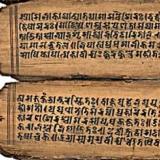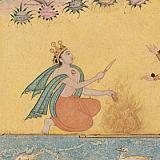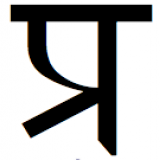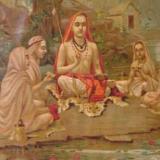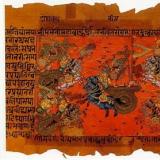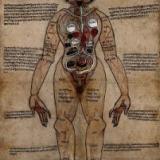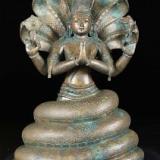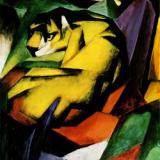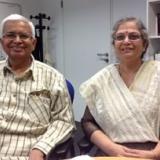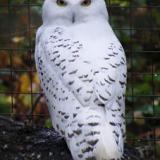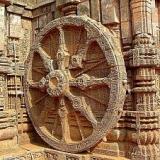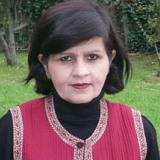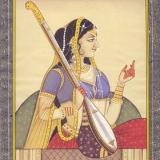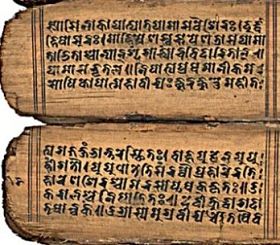Age of the Sutra
The second part of our series on philosophy in India examines the "age of the sūtra." The sūtra (literally "thread") was a genre of writing in which ideas were set forth in brief, aphoristic form. Various sūtras were taken as authoritative and foundational for numerous schools of Indian thought, which devoted further commentaries to the sūtras. Historically, these episodes cover the period in which most of the sūtras and initial commentaries were written, that is, approximately the first several centuries CE (though some sūtras are older, and the commentaries were written over many centuries). At this time, we see numerous intellectual traditions emerge: Sāṃkhya, Yoga, Nyāya, Vaiśeṣika, Mīmāṃsā, Vedānta, and Cārvāka. These episodes cover the main developments and disputes found in the sūtras and commentaries, with a focus on such issues as the self and mind's relation to the material world, philosophy of language, the efficacy of ritual, and the sources of human knowledge. Look out for interviews with experts on this period, including Monima Chadha, Francis Clooney, Elisa Freschi, V.N. and Ujjwala Jah, and Philipp Maas.
In addition to the general reading list recommended here, see also:
C. Bartley. An Introduction to Indian Philosophy (London: 2011).
J. Bronkhorst, Language and Reality: on an Episode in Indian Thought, trans. M.S. Allen and R. Raghunathan (Leiden: 2011).
M. Dasti, "Six Systems/Darśanas" (Oxford Bibliographies).
W. Edelglass and J. Garfield (eds), The Oxford Handbook of World Philosophy (Oxford: 2011), the Section on Non-Buddhist Indian Philosophy.
J. Ganeri, The Concealed Art of the Soul: Theories of Self and Practices of Truth in Indian Ethics and Epistemology (Oxford: 2007).
J. Gonda (ed.), A History of Indian Literature (Wiesbaden: 1975-): includes numerous volumes on philosophical schools.
D. Krishna (ed.), Discussion and Debate in Indian Philosophy: Issues in Vedanta, Mimamsa and Nyaya (New Delhi: 2004).
K.H. Potter (ed.), Encyclopedia of Indian Philosophies (Princeton: 1977-).
Entries on “Sāṃkhya,” “Yoga Sutras”, “Nyāya”, and “Advaita Vedānta” in the Internet Encyclopedia of Philosophy.
Numerous relevant entries on the Stanford Encyclopedia of Philosophy.
Posted on
Rival philosophical schools proliferate and subdivide in our second major historical period, the “age of the sūtra.”
Posted on
Skeptical tendences in Indian thought and responses to skepticism from the Mīmāṃsā and Vedānta schools.
Posted on
In the Mīmāṃsā school’s founding text, Jaimini systematizes Vedic ritual and explores its theoretical basis.
Posted on
The Mīmāṃsā school put their faith in sense experience, and argue that the Veda, and hence language itself, had no beginning.
Posted on
Mīmāṃsā expert Elisa Freschi speaks to Peter about philosophical issues arising from the interpretation of the Veda.
Posted on
The founding text of the Vedānta school, the Vedānta- or Brahma-Sūtra, interprets the Upaniṣads as teaching that all things derive from brahman.
Posted on
Śaṅkara and his “non-dual” (Advaita) Vedānta, which teaches that only brahman is real, and the world of experience and individual self are mere illusion.
Posted on
The grammarian Bhartṛhari argues that the study of language is the path to liberation, because the undivided reality underlying language is brahman.
Posted on
Francis Clooney joins us to discuss the religious and philosophical aspects of Vedānta.
Posted on
The oldest treatise of Sāṃkhya enumerates the principles of the cosmos and of the human mind.
Posted on
Philosophical aspects of Ayurveda, focusing on the oldest surviving medical treatise, the Caraka-Saṃhitā.
Posted on
Yoga as presented by Patañjali offers a practical complement to the Sāṃkhya theory of the cosmos and the self.
Posted on
A leading expert on the founding text of Yoga tells us why, when, and by whom it was written, and what it has to do with modern day yoga practice.
Posted on
The Nyāya-Sūtra inaugurates a tradition of logical and epistemological analysis.
Posted on
Nyāya philosophers explain how perception can bring us knowledge.
Posted on
Gautama and his commentators tell us how to separate good inferences from bad ones.
Posted on
Nyāya proposes that each of us has both a self and a mind, in addition to the body.
Posted on
The First Family of Indian Epistemology joins us to discuss the theories and later influence of the Nyāya school.
Posted on
The Vaiśeṣika school offers a metaphysical analysis of the world and an atomistic physics.
Posted on
The Vaiśeṣika response to Buddhist skepticism about wholes made up of parts.
Posted on
Ancient Indian cosmology and the Vaiśeṣika defense of the reality of time and space.
Posted on
The Cārvāka or Lokāyata tradition rejects the efficacy of ritual and belief in the afterlife, and restricts knowledge to the realm of sense-perception.
Posted on
Pāyasi and the Cārvāka anticipate modern-day theories of mind by arguing that there is no independent soul; rather thought emerges from the body.
Posted on
Monima Chadha takes Peter through Buddhist-Hindu debates over mind and self.
Posted on
Bharata’s Nāṭya-Śāstra and later works from Kashmir explore the idea of rasa, an emotional response to drama, music, and poetry.




